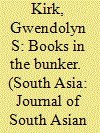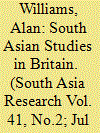|
|
|
Sort Order |
|
|
|
Items / Page
|
|
|
|
|
|
|
| Srl | Item |
| 1 |
ID:
172229


|
|
|
|
|
| Summary/Abstract |
Under United States Public Law 480, a major hallmark of Cold War diplomacy, India received millions of dollars in loans from the US during the 1950s and 1960s in the form of food and agricultural products. A portion of the interest due on this loan was repaid by India partly in the form of books in about two dozen languages which were collected from across South Asia and sent to the Library of Congress and several universities in the country during the heyday of the development of Area Studies. The object of this paper is a large deposit of written material—books, periodicals and ephemera—that was sent to the University of Texas at Austin over a period starting in the 1960s under the PL 480 programme. Most of these materials were added to the library collections, but a large number of them remained uncatalogued for about fifty years in an underground library storage facility in downtown Austin. The history of these materials, and the moment when they reappeared provides a case study of how books are appropriated (or not) into academic, library and political assemblages, and the way disciplines and their canons have been shaped by politics and infrastructure from the Cold War into the neo-liberal age.
|
|
|
|
|
|
|
|
|
|
|
|
|
|
|
|
| 2 |
ID:
170668


|
|
|
|
|
| Summary/Abstract |
This issue of South Asia Research (SAR) marks and celebrates 40 years of an academic venture that began in very different conditions than one faces in publishing today. Initially, it was quite a modest in-house product, with the first issue of this journal published in May 1981. The decision at SOAS in 1980 to establish a journal run by doctoral students involved a team including the historian Rosalind O’Hanlon, now Professor of Indian History and Culture at Oxford, the historian Vanessa Harvey-Samuel and the anthropologist Catherine Thompson. The moment of taking the initiative to use print to stimulate progress, academically as well as personally, matches remarkably well with the research focus of many South Asianists on the role of the printing press. It appears in the work of O’Hanlon herself on Marathi sources and is still present in recent studies that illustrate, for example, how a Tamil religious leader and his followers ‘used print as a tool to garner religious and textual authority’ (Weiss, 2019: 52). Seen in this light, the creation and production of SAR was a landmark event in the development of South Asian Studies not just at SOAS but globally. Forty years later we are, indeed, a truly global journal, respected (and cited) worldwide.
|
|
|
|
|
|
|
|
|
|
|
|
|
|
|
|
| 3 |
ID:
076066


|
|
|
|
|
| Publication |
2006.
|
| Summary/Abstract |
The decline of class analysis has been pervasive across the intellectual landscape in recent years. But South Asian studies stands out in the severity with which it has been hit by this phenomenon. It also is the field where the influence of post-structuralism has been most pronounced in the wake of Marxism's decline. This essay offers an explanation for both the decline of class analysis and the ascendance of post-structuralism in South Asian studies as practiced in the United States. I suggest that the decline of class theorizing was a predictable and natural result of the decline of working-class politics in the United States. But the severity of its decline in South Asian studies in particular was a symptom of its never having made much of a dent on the field in the first place. This left unchallenged the traditional, Indological approach, which was heavily oriented toward culturalism. This in turn made the field a hospitable ground for the entrance of post-structuralism, which, like mainstream Indology, not only eschews materialist analysis, but is largely hostile to class. South Asian studies is thus one of the few fields in which traditional scholars and younger ones are both able to agree on their hostility to class analysis. Finally, I argue that the decline of class is now visible in Indian universities too, and this is largely caused by the overwhelming influence that U.S. universities have come to exercise over Indian elite academic culture.
|
|
|
|
|
|
|
|
|
|
|
|
|
|
|
|
| 4 |
ID:
178423


|
|
|
|
|
| Summary/Abstract |
Following Roger Ballard’s sudden and untimely death, at a time when only a few of us could assemble to remember him, it was decided to put together a compilation of brief tributes from colleagues who worked with or were once taught by him. This also provides insights into his significant role in South Asian Studies in Britain and elsewhere. We begin with a picture (which truly is worth a thousand words) of Roger as a young man in 1964, annotated by his sister, Sylvia:
|
|
|
|
|
|
|
|
|
|
|
|
|
|
|
|
|
|
|
|
|